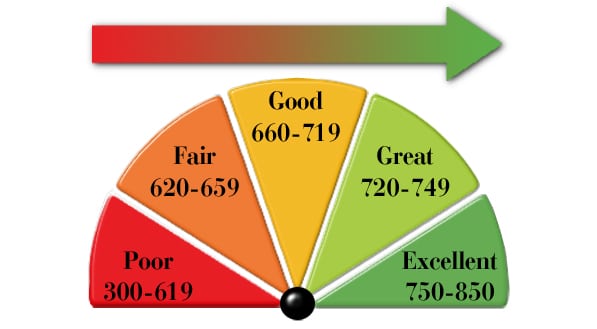Payment History
Payment history is the #1 consideration for your credit score. Accounting for 35% of your FICO score, it’s the most important thing you need to keep track of.
Despite what you may have read online or heard on your favorite financial talk show, you do not have just one credit score. You do not even have just 3 credit scores – one from each of the major credit bureaus (Equifax, TransUnion, and Experian). In actuality you have hundreds of different credit scores.

The top 2 competing brands of credit scores are FICO and VantageScore. However, FICO scores are still the scores of choice for the vast majority of lenders in the United States. As a result, if you are working to improve your credit in order to qualify for a mortgage, an auto loan, or any other type of financing then understanding exactly how your FICO credit scores work is an essential key to your success.
Which Information Matters?
All credit scores are calculated based upon the same information, the information contained in your credit reports. If something is not included in your credit reports then it cannot be a factor in your credit scores. While FICO does not exactly release the recipe for their “secret sauce,” aka the exact algorithm used to compute your credit scores, the company does offer consumers a guide which explains which information in your credit reports is actually relevant.

There are 5 categories of information which FICO considers when tallying up your credit scores. In this series we will cover all 5 categories in depth, teaching you how to leverage this information to your advantage. Earning better credit scores starts with understanding how credit scores work.
The Payment History Category
FICO bases the largest percentage of your credit scores, 35% to be exact, upon the “Payment History” category of your credit reports. The fact that your credit scores are most heavily based upon how your pay your bills probably is not surprising. After all, if you are applying for a new loan the first thing a lender will want to know is how you have managed your financial obligations in the past.
It would arguably make a bit more sense if this category was named “the presence or absence of negative information” since FICO’s scoring models essentially ask this question of your credit reports when calculating your scores. For example, a scoring model might ask “does the credit report contain late payments?” If the answer is no, you will gain a certain number of points to be added to your credit scores. If the answer is yes, you will earn a lesser number of points to be added to your overall scores.
Important Factors
FICO considers a variety of information within the “Payment History” category of your reports. Here is a list to help you understand some of the credit information which is most important within this category.
- The Presence (or Absence) of Late Payments
-> If late payments occurred, how late were they?
-> If late payments occurred, how recently did they happen?
-> If late payments occurred, how many times?

- The Presence (or Absence) of Negative Information
-> Public Records (Judgments, Bankruptcies, Tax Liens)
-> Collection Accounts
-> Foreclosures
-> Repossessions
- How many accounts have no late payments?
Food for Thought
If you believe you have problems within the Payment History category of your credit reports, be sure that the information being reported is 100% accurate. You can access a free copy of your credit reports online at AnnualCreditReport.com or schedule a credit report review with one of our certified professionals. Credit report errors are common and could be lowering your credit scores unfairly.
Also, remember that having a flawless payment history does not automatically qualify you to earn a perfect 850 credit score either. Your payment history only accounts for 35% of your overall credit score. There are many other factors which are relevant. Be sure check out parts 2-5 of this series to learn more about the other 65% of your credit scores so that you can arm yourself with the information you need to be a true credit rock star.


